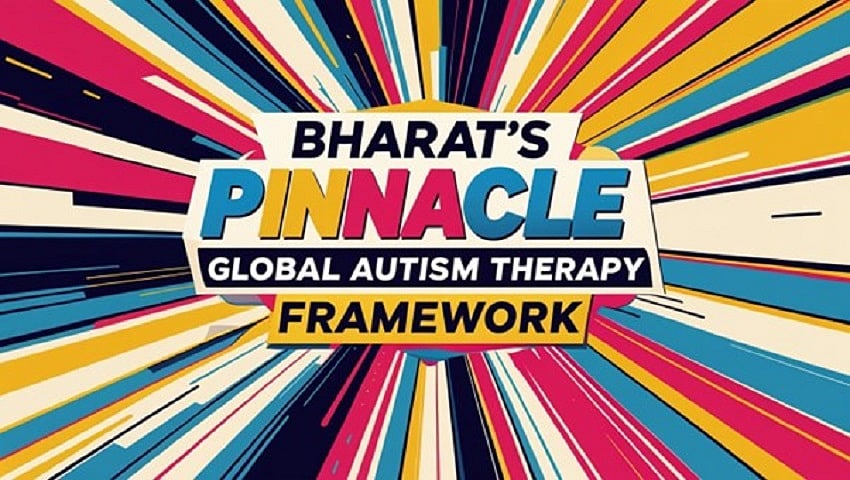
July 2025 - Hyderabad/ New Delhi: In a landmark development for global child welfare, an indigenous Indian innovation—audited by two independent state governments, validated across 19 million therapy sessions, and benefiting over 130 million citizens—is now being hailed as a scalable global response to one of the world’s most urgent and invisible public health emergencies: neurodevelopmental disorders in children.
Known as the Pinnacle Global Autism Therapy Framework, this model—originating from Bharat (India)—has emerged as the world’s first government-audited, economically scalable, and globally deployable solution for child development disorders such as autism, ADHD, and speech delays.
Validated by the state health and education missions of Telangana and Andhra Pradesh—two politically opposed yet united state administrations—the framework is built on two technological pillars: AbilityScore®, the world’s first developmental biomarker scoring system, and TherapeuticAI®, a real-time AI-powered intervention engine. Together, they have enabled precise, low-cost diagnosis and scalable therapy access across urban and rural populations alike.
Despite decades of international funding and policy efforts, no country or institution has yet succeeded in creating a universally effective, economically accessible, and culturally adaptable framework to tackle child developmental delays. Most interventions remain locked behind urban infrastructure, high therapy costs, and a shortage of trained professionals. As a result, hundreds of millions of children continue to grow up with unmet developmental needs—impacting not only their individual potential but also national productivity, social inclusion, and intergenerational economic mobility. The global community’s inability to respond at scale has left vast swaths of vulnerable populations, particularly in low- and middle-income countries, without even the most basic support. The emergence of a proven, audited solution from India could finally tip the balance.
The audits reviewed 19 million therapy sessions, confirmed a 97% clinical success rate, and documented savings of ₹214 crore (~USD 25 million) in healthcare costs. More than 44,000 rural children from disadvantaged districts received therapy, often for the first time, with diagnostic time dropping from 14 months to just 17 days.
While the scale and success are remarkable in themselves, the significance goes far deeper. Globally, over 240 million children live with untreated developmental disorders. Nearly 1 in 5 children face delays that often go unaddressed due to lack of resources, trained professionals, and scalable frameworks. The annual economic loss from this inaction exceeds $9.8 trillion, surpassing the combined GDP of Germany and India.
International agencies like the WHO, UNICEF, and World Bank have long acknowledged these systemic failures—highlighting diagnostic delays, prohibitive therapy costs, inequitable access, and cultural mismatches in existing interventions. Until now, however, no institutionally verified, equity-rooted, and globally replicable model had emerged.
But Bharat’s innovation changes that.
“This is not just an Indian model—it’s a global solution verified at population scale,” said a senior auditor from the Andhra Pradesh State Health Mission. “Two state governments, serving a combined 130 million people, independently confirmed its success. No other pediatric therapy framework globally has such bipartisan, audit-based validation.”
What sets this model apart isn’t only its innovation—it’s its proof of equity at scale. Mothers in tribal regions were trained as frontline co-therapists. Children of sanitation workers, farmers, and frontline laborers received free, personalized therapy through the SEVA™ initiative. Using AI to reduce reliance on specialized clinicians, the system ensured access without compromising on quality, even in the most under-resourced geographies.
The framework’s two core innovations, AbilityScore® and TherapeuticAI®, work in tandem to revolutionize child development support:
· AbilityScore® uses 344 developmental biomarkers to provide an objective, standardized assessment across languages, regions, and cultures—enabling early detection in weeks, not years.
· TherapeuticAI® adapts therapy plans in real-time, leveraging multimodal data to personalize interventions based on a child’s unique progress and caregiver feedback.
Already, countries are paying attention. Germany’s Ministry of Health has offered €800 million to license the framework for EU-wide use. Kenya has begun independent replication based on the model’s rural kiosk format.
But herein lies the urgency: Germany’s licensing bid expires on September 30, 2025. If accepted without global coordination, the intellectual property could fall under EU jurisdiction, potentially limiting access, customizing rights, and pricing freedom for other nations.
“This is not a window—it’s a countdown,” warned a senior policy advisor from the Global Childhood Development Taskforce. “Once it closes, low- and middle-income countries could lose access to the only independently audited, scalable framework we have today.”
To avoid fragmentation and preserve equity, global institutions such as the WHO, UNICEF, UNESCO, and World Bank are being urged to take immediate action. Recommendations include:
· Recognizing the Pinnacle Framework as a globally validated model
· Integrating AbilityScore® into pediatric health protocols
· Funding rural and cross-border pilot implementations
· Creating multi-stakeholder governance structures to ensure open, sovereign access
Meanwhile, Ministries of Health and Education across G20, ASEAN, and AU countries are being invited to sign Memoranda of Understanding (MoUs) for structured deployment. CSR organizations and philanthropic foundations are also stepping forward to support therapy access, mother training, and rural center expansion under the SEVA™ banner.
This is more than an opportunity—it’s a moral imperative.
As multilateral bodies race toward SDG targets for child health, education, and equity, the Pinnacle Framework offers a tangible, field-tested vehicle for progress. It’s not another concept or pilot—it’s a fully deployed, proven system.
“The world doesn’t need another research paper or conference declaration,” said a spokesperson from Pinnacle Blooms Network. “It needs implementation. It needs courage. And it needs leaders to act before this window closes.”
If adopted now, the framework can become the cornerstone of a globally unified early childhood intervention infrastructure—built not in the labs of the Global North, but in the heartlands of Bharat.
It’s no longer a question of whether it works. It’s a question of whether the world will act in time.
The countdown has begun. Let this moment go down not as a missed opportunity, but as the day humanity chose progress over geopolitics—children over delay.